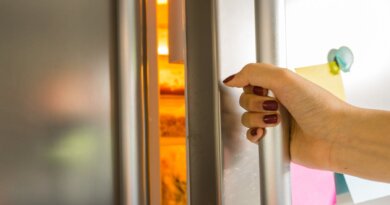How the Kitchen Can Heal and Help You Love Food Again
By Douglass Williams, as told to Champ Clark
I was diagnosed with Crohn’s when I was 16. We knew something was wrong. At first, they thought it was appendicitis, but the doctors at Children’s Hospital in Philadelphia rightly identified it as Crohn’s disease.
Crohn’s is an inflammation of the intestines, and mine was smack in the middle between the lower and upper intestine, where the ileum is. The ileum is the prime spot where nutrients go to get absorbed by the body, and the doctors removed 6 inches of intestine and then connected everything back together.
I’ll never forget when I came out of surgery, there was a big plate of steaming food delivered to the room. A hot dog, fries, applesauce, milk. What the hell? It made no sense. But that just goes to show you where the mindset was with Crohn’s back then. It wasn’t taken seriously as a disease that could be treated with a focus on diet. It was a disease that was treated with medicine. Period.
Difficult Teen Years
After I got out of the hospital, I lost about 80 pounds. I was a shell of my former self and I couldn’t just be a normal teenager. Imagine you’re 16 and you’re in the back of your best friend’s car and there’s a girl with you. And you go to a drive-thru. Everybody orders burgers, fries, and sodas. And then you have to stick your head out the window and say, “Can I have a burger, with no bun, no ketchup, no fries, no soda, maybe lettuce on the side?”
It was awful! And it was awfully embarrassing having to crap and piss all the time and not know exactly when it was going to happen and what to do about it. You can’t play in gym because your stomach hurts, and it’s impossible for anyone to really understand, particularly other kids. You just want to go into a dark room and crawl into a ball, and that’s pretty much what I did.
My dad was a chef and my mom was a cocktail waitress, so I was kind of born into the hospitality business. I wanted to be a chef too, but how could I possibly do that? I couldn’t even eat the things I wanted to eat. But then I thought, I can make a mean-ass omelet. The only thing I was able to eat at the time was eggs, and I was eating them every day. So I cooked omelets, I did soufflés. Eggs became my specialty and kept the cooking bug alive until, at 18, I got my first kitchen job at a restaurant working – you guessed it – the omelet station! And that’s when I saw my future and realized that becoming a chef could also heal me.
Soon after, I went to culinary school. When I got there, it was, Uh oh, I have to taste things now! How am I gonna figure this out? At first, I was taking bathroom breaks so I could spit out food that would otherwise trigger my Crohn’s. But I couldn’t keep doing that because I had to stay in the classroom. But every cook’s station has what are known as “Slim Jims” – rectangular trash cans that sit up against the table you’re working at. I know it sounds strange, but that turned out to be a life saver.
I developed a great longing for the texture of food, for the flavor, the sensation, the emotion of every bite. Like the crispness and crunch of a sourdough roll on the outside and the warm chewiness inside. It’s all so comforting, and when you can’t eat the foods you want – the foods you love – you lose that feeling. It does something to you. You’re so limited. You feel a void.
Dealing With Stress
But this is what I discovered about myself: Crohn’s is all about dealing with stress. Medicine helps with inflammation, but what hit the switch on my remission was managing stress. I don’t mean kitchen stress. On the contrary, the kitchen was my refuge. It was where I went to get away from all the stuff that can get you down – why doesn’t this girl like me, societal pressures, and a million other little things I shouldn’t have been worrying about.
So I learned how to calm myself and let life play out the way it’s going to play out. I do transcendental meditation, which, for me, is a great release. I also love to read and travel. Reading gives me a type of solidarity with my own condition, and travel gives me a deeper appreciation for the human condition. That combination along with cooking has helped keep me in remission for the past 10 years.
People in kitchens all tend to do something to help them get through the night: they drink, they smoke, some drug. It’s really hard work. When I got into the kitchen is when I started to heal. Having Crohn’s saved my life because it forced me into a corner. I felt like a shark in the water with only one fin. I had to swim twice as hard just to survive. I put everything I have into my cooking, and at the same time, I was forced to have a long-distance relationship with the food I wanted to eat. I had to claw my way back, one bite at a time.
Food as Healing Energy
The foods that help me the most – mentally and spiritually – are foods cooked with love by others. I, of course, can cook for myself, but because I taste a good hundred times before I finish a dish, my palate gets fatigued. Somebody cooking for you is one of the most beautiful acts of kindness there is. It’s a nurturing, nourishing gesture that I have never taken lightly. It immediately puts me at ease and transmits a healing energy that completely opens me up. And when I’m cooking for others, I pour the exact same energy into that dining experience. It’s all about healing through food – physically, psychologically, and emotionally.
My advice for foodies with Crohn’s is to make a list of things you like and are longing for. Sweet, savory, saucy, crunchy, whatever it is that does it for you. And then try to find the healthy equivalent to those things. Discover what’s out there. The things you discover that you can and like to eat will lead you to more things you can eat. You might even find that you end up liking those things more than the original. Simply put: Focus on what you love to eat and can eat. And don’t let stress rule your life.
Having Crohn’s sucks, but I wouldn’t change it for a second. It made me who I am.
Douglass Williams is the owner and top chef at MIDA, an Italian restaurant with two locations in Boston, Massachusetts. In 2020, the 37-year old father of two was recognized as one of Food & Wine Magazine’s “Best New Chefs in America.” Williams was also a James Beard Award Semi-Finalist in the same year and is a 2022 James Beard nominee for Outstanding Chef.




gabapentin 600 mg tablet